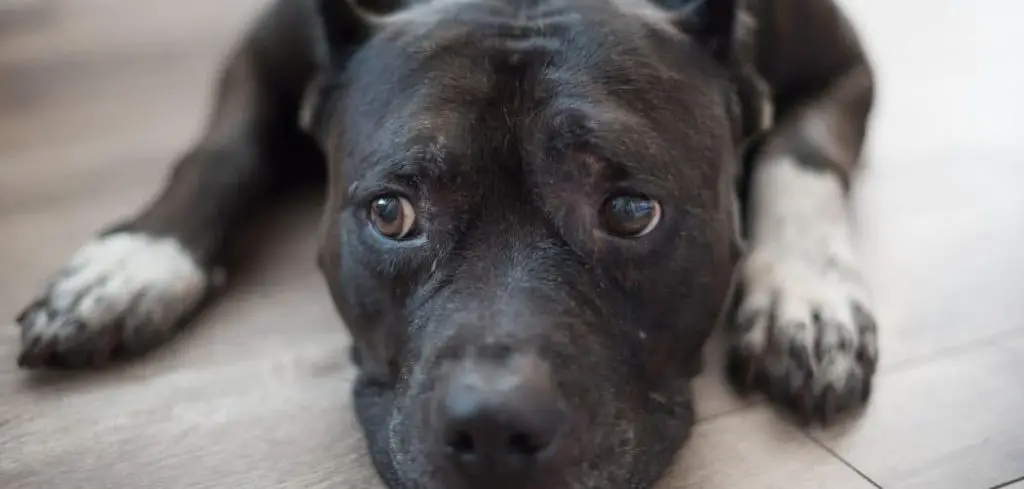When your dog is throwing up bile constantly, it’s a sign that something deeper is wrong with their digestive system.
Occasional bile vomiting can happen in otherwise healthy dogs, but persistent vomiting points to irritation or an underlying disease.
We outline the common causes of a dog throwing up bile constantly, what you can do at home, and when to seek veterinary help.
Dog Throwing Up Bile Constantly — Why It Happens
A dog that is vomiting bile constantly is usually dealing with ongoing irritation of the stomach or intestines, a serious imbalance in digestion, or a more significant health condition. This happens when the stomach remains empty but is still producing acid and bile, or when inflammation, obstruction, or disease interferes with normal digestion.
Causes range from simple factors like irregular feeding schedules to severe conditions such as pancreatitis, intestinal blockages, or liver disease.
Continuous bile vomiting should always be taken seriously, as it can quickly lead to dehydration and further complications.

Dog Throwing Up Bile Constantly: Common Causes
Bilious Vomiting Syndrome
Bilious vomiting syndrome occurs when a dog vomits bile, often in the early morning or late at night when their stomach has been empty for too long.
Unlike occasional bile vomiting, constant episodes indicate that the stomach lining is irritated on a regular basis. Dogs may appear otherwise normal but still bring up yellow or green bile frequently.
Adjusting feeding schedules and diet often helps, but persistent cases may require veterinary treatment to manage stomach acid production.
Read more: Dog Throwing Up Bile and Lethargic (Signs to watch for)
Intestinal Blockage
A partial or complete intestinal blockage is one of the most serious causes of continuous bile vomiting. Dogs may swallow toys, bones, or other foreign objects that obstruct the intestines.
This prevents food and liquid from passing normally, leading the stomach to expel bile repeatedly.
Other signs include straining, abdominal pain, loss of appetite, or bloating. This is a medical emergency requiring immediate veterinary care, often surgery.
Pancreatitis
Pancreatitis, or inflammation of the pancreas, is a common cause of constant bile vomiting in dogs. The condition disrupts digestion and triggers severe abdominal discomfort.
Dogs with pancreatitis often refuse food, become lethargic, and may also show diarrhea or constipation.
Since it can worsen rapidly and cause systemic illness, ongoing bile vomiting with abdominal pain should not be ignored.
Liver Disease
The liver plays a key role in bile production and digestion. When liver disease develops, bile may not be processed normally, leading to frequent vomiting.
Dogs with liver issues may also show yellowing of the gums or eyes (jaundice), increased thirst, or weight loss.
Chronic vomiting of bile in combination with other symptoms should prompt immediate veterinary evaluation and blood testing.
Stomach Inflammation (Gastritis)
Chronic gastritis, or ongoing inflammation of the stomach lining, can cause dogs to vomit bile repeatedly.
This may be triggered by infections, poor diet, allergies, or long-term use of certain medications.
Dogs with gastritis often have poor appetite, occasional diarrhea, and abdominal sensitivity. Left untreated, gastritis can progress into ulcers and worsen vomiting frequency.
Kidney Disease
In dogs with kidney disease, toxins build up in the body because the kidneys are unable to filter waste effectively.
This toxic buildup can irritate the stomach, leading to nausea and frequent bile vomiting. Dogs with kidney disease also often drink more water, urinate frequently, and show signs of weakness or weight loss.
Continuous vomiting in this case requires urgent treatment to prevent further organ damage.
What to Do If Your Dog Is Throwing Up Bile Constantly
If your dog vomits bile once but seems fine afterward, simple measures like adjusting feeding times and providing bland food may help.
However, if vomiting is constant, at-home care should only be supportive until veterinary care is sought. Offer small, frequent meals of bland, easily digestible food such as boiled chicken and rice.
Ensure your dog has constant access to fresh water to prevent dehydration, and encourage rest in a calm environment.
Avoid giving treats, fatty foods, or table scraps, as these may worsen the symptoms. Never administer human medications unless directed by your vet.
Keep track of how often your dog vomits, any additional symptoms, and changes in appetite or behavior, as these details help your veterinarian identify the cause.
When to Call or Visit Your Vet
You should contact your veterinarian if your dog vomits bile more than once in a day or if the vomiting continues for more than 24 hours.
Seek emergency care if your dog shows signs of abdominal pain, bloating, collapse, blood in vomit, or refusal to eat or drink.
Puppies, senior dogs, and those with chronic health conditions are especially vulnerable and should not be left untreated.
Persistent bile vomiting can indicate pancreatitis, intestinal blockage, or organ disease—all of which can become life-threatening without prompt treatment. Trust your instincts: if your dog seems weak, in pain, or unable to keep anything down, it’s time to see the vet immediately.
Read more: Dog Throwing Up Bile and Foam (Possible causes explained)
Key Takeaway
Constant bile vomiting in dogs is a red flag that should never be ignored. While occasional bile vomiting may not always mean something serious, persistent episodes point to a deeper problem such as pancreatitis, gastritis, blockage, or organ disease.
Supportive care at home may help briefly, but the safest course of action is always to seek veterinary evaluation.
Acting quickly can make all the difference in your dog’s comfort, recovery, and long-term health.
